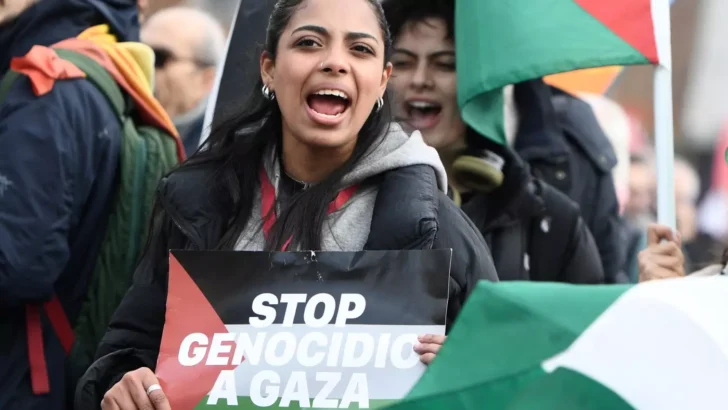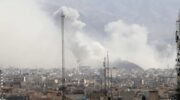A political entity that is committing the most egregious crimes in the world isn’t being unfairly targeted by those mobilizing against it
by Gregory Shupak, reposted from Middle East Eye, May 16, 2024
In a column last month, Washington Post associate editor Ruth Marcus criticized the International Court of Justice’s (ICJ) finding that it is “plausible” that Israel is committing genocide in Gaza.
She asserted that “somehow Israel seems always to be held to a different, higher standard than other countries. The ICJ’s ruling is the latest manifestation of this familiar double standard, from an entity from which we should be able to expect better”.
The ICJ’s finding doesn’t stem from holding Israel to “a different, higher standard”. Haaretz reported that, during the first three weeks of Israel’s offensive in Gaza, 61 percent of those Israel killed were noncombatants, whereas author Yagil Levy points out, “in wars fought during the 20th century, up until the 1990s, about half of those killed were civilians.”
Similarly, The New York Times reported that “experts say that even a conservative reading of the casualty figures reported from Gaza shows that the pace of death during Israel’s campaign has few precedents in this century”.
Israel is committing atrocities against innocents on a scale with few, if any, contemporary equivalents so it deserves a commensurate effort to get it to stop and hold it to account.
Marcus cited Nicaragua as an example of this supposed “double standard”. Nicaragua filed a request for the ICJ to order Germany to halt military and other aid to Israel and to resume funding the United Nations Relief and Works Agency (Unrwa), which Germany had stopped doing because of Israel’s evidence-free claim that many Unrwa employees took part in the 7 October attack.
For Marcus, it is “fantastical” and “more than a bit rich” for Nicaragua to seek such measures against Germany and Israel because, the day before Nicaragua’s ICJ filing, the UN had accused Nicaragua’s government of violating its citizens’ human rights.
Setting aside any debates about Nicaragua’s internal politics, Marcus’s position is absurd on its face. In the 1940s, the United States, Britain and France had many indefensible domestic and foreign policies, but that didn’t invalidate the Nuremberg Trials.
More to the point, in March, Unrwa reported that more children had been killed in Gaza in five months of Israeli attacks – 12,300 – than in all the wars in the world in the past four years combined.
If the Nicaraguan government has engaged in undemocratic practices, then that’s worth criticising. But not even its most strident opponents say that it has done anything nearly as monstrous as creating a mass “graveyard for thousands of children”, as Israel had already done just weeks into its assault on Gaza. Whatever Nicaragua’s internal flaws, it’s ludicrous to say that these are so severe that they mean the country has no business trying to stop Israel from massacring even more children.
Joseph Epstein similarly complained in a Newsweek article that Palestine solidarity activists at Columbia University “single out Israel for blame”. He put forth the dubious suggestion that “the ‘pro-Palestinian” warriors” were silent during the 2015 siege of the Yarmouk Palestinian refugee camp amid fighting between the Syrian government, ISIS and the al-Qaeda affiliate Jabhat al-Nusra.
Because of this brutality, Epstein pointed out: “Many Palestinians died of hunger”. Epstein’s argument doesn’t withstand scrutiny. As Alex de Waal, a Tufts University scholar and an authority on famine, has written: “The rigor, scale and speed of the destruction of [Objects Indispensable to Survival (OIS)]” in Gaza and the “enforcement of the siege [of the Strip] surpasses any other case of man-made famine in the last 75 years.”
He also noted that the “absolute numbers of people who will die in Gaza’s catastrophe will not match the great and calamitous famines of the 20th century, solely because the afflicted population is smaller”, but “the proportionate death toll may be comparable”.
The US-Israeli starvation of Gaza appears on track to surpass even the appalling suffering inflicted on Yarmouk, and to become one of the deadliest per capita famines on record. In this regard, Epstein’s sick attempt to pit one tragedy against another – a clear attempt to divert attention from the currently unfolding famine – falls utterly flat.
A suitable response
Marcus and Epstein are hardly the only ones to traffic in this nonsense. The untenable notion that Israel is being unfairly “singled out” is a recurring theme in Newsweek.
Pea-brained “comedian” Bill Maher put forth the case on HBO.
Nicholas Kristof of The New York Times wrote an incoherent article in a similar vein. He said he “can’t think of any conflict in this century that has killed babies” at the same pace as Israel’s rampage in Gaza while also claiming that there is “absolutely” a “double standard” in the amount of attention Israel’s crimes get both internationally and on US campuses.
“Defenders of Israel have every right to point all this out”, he added. One would think that murdering babies at a rate without parallel in the 21st century merits unique scrutiny and fierce opposition.
The idea that supporters of the Palestinians unjustly “single out” Israel is an old talking point deployed by Israel and its supporters since long before October 7 to deflect attention from Israel’s denial of Palestinian rights.
Prior to the start of the ongoing genocide, Israel was already enacting the world’s longest military occupation. Furthermore, in the words of the scholar Anne Irfan: “The Palestinians are the world’s largest refugee population, with the longest-running case of protracted displacement.”
Palestinians are in this condition because Israel refuses to let them return to their homes even though UN Resolution 194 affords them that right. For these reasons, Israel’s pre-October 7 policies warrants special attention.
A political entity that, by many metrics, is presently committing the most egregious crimes in the world isn’t being unfairly “singled out” by those who are mobilizing against it and standing with the people it is subjecting to genocide.
Israel is killing civilians, notably children, including through forced starvation, at one of the worst rates in living memory. That Israel is doing so to a population that it has held captive longer than any other state is doing to any other people compounds the outrage.
The broad-based Palestine solidarity movement in the courts, on the streets and on campuses is a suitable response – in fact, let us hope that these are just the early phases of one.
Gregory Shupak teaches English and Media Studies at the University of Guelph-Humber in Toronto. He is the author of the book, The Wrong Story: Palestine, Israel, and the Media.
RELATED ARTICLES:
- Israeli Destruction of Gaza: The Facts
- Cruelty of language: Leaked NY Times memo reveals moral depravity of US media
- Genocide Unfolding
- Israel and US deliberately gutting international law in Gaza
- Top Pentagon Officer Said Politicians Get ‘Very Rich’ by Supporting Israel
- New report shows Biden is going to extraordinary lengths to continue arming Israel
- Not even the US government knows the US government line on Rafah





